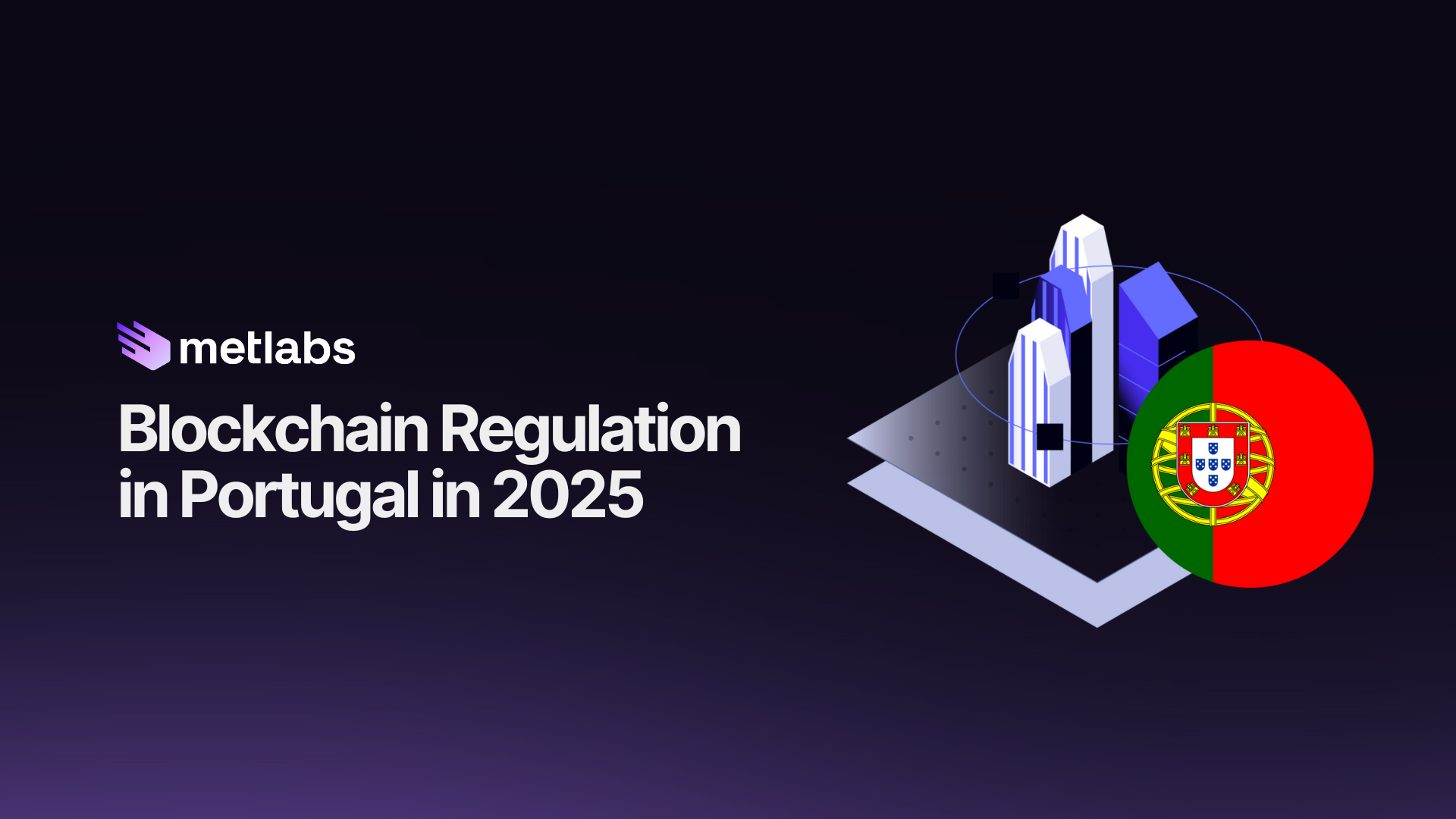The adoption of blockchain technology and asset tokenization is advancing at a rapid pace, but the real engine driving its global development is the existence of a clear, consistent and innovation-friendly legal framework.
Some countries have already established themselves as regulatory benchmarks, establishing specific rules for cryptoassets, DLT infrastructures and token issuance with legal backing. In this article we show you relevant information about blockchain regulation in Portugal, which you can use as a guide if you are looking to operate internationally or evaluate different strategic locations.

Current legislation on blockchain and virtual assets in Portugal
MiCA Regulation (Markets in Crypto-Assets Regulation)
Establishes the EU’s first comprehensive legal framework for regulating cryptoasset issuers and service providers (CASPs). Covers stablecoins, utility tokens, electronic money tokens (EMTs), asset referenced tokens (ARTs), and custody or exchange platforms. Requires prior authorization, governance requirements, solvency, transparency, and user protection.
MiFID II (Markets in Financial Instruments Directive II)
European Directive that regulates the markets of traditional financial instruments and also applies to cryptoassets considered as financial instruments (e.g. security tokens). It establishes rules on transparency, investor protection, advisory services, order execution and prudential requirements for investment firms.
Law 83/2017 (Law on the Prevention of Money Laundering and Terrorist Financing).
It is the main legislation in Portugal regarding the prevention of money laundering and terrorist financing (AML/CFT). It establishes obligations from 2020 for cryptoasset service providers (CASP). It requires customer identification (KYC), transaction monitoring and suspicious activity reporting to the Financial Information Unit (FIU). It was amended to incorporate the AMLD5 Directive, strengthening controls over the crypto sector.
Law No. 24-D/2022 (Cryptoassets Tax Regime)
Introduced for the first time a specific tax regime for cryptoassets in Portugal. It establishes a 28% tax on capital gains obtained on the sale and purchase of cryptoassets held for less than one year, being exempt if they are held for longer and are not part of a professional activity. It also regulates the taxation of mining, staking, airdrops and gratuitous transfers (donations or inheritances), subject to Stamp Tax. This law puts an end to the previous tax loophole and aligns the Portuguese system with European standards.
Notice 3/2021 of the Bank of Portugal
Establishes the rules for the registration and supervision of CASPs. Any entity offering services such as exchange, custody or transfer of cryptoassets must mandatorily register with the Bank of Portugal. This notice requires compliance with money laundering prevention measures (KYC, AML/CFT) and the submission of detailed information on the company’s structure and internal control.
Cryptoassets Sandbox and DLT Pilot Regime in Portugal
Portugal participates in regulatory sandbox initiatives at both national and European level. The regulatory sandbox allows fintech and blockchain companies to test innovations in a controlled environment, under the supervision of financial authorities. This fosters collaboration between companies and regulators, facilitates the detection of regulatory barriers and promotes responsible innovation.
Tokenization makes it possible to digitally represent real-world assets through blockchain, but for it to have legal value, it is essential that there is a regulatory framework that recognizes this operation. Portugal adopts its own approach, establishing specific rules for the issuance, custody or trading of tokens. In this block we explain how asset tokenization is regulated from a legal point of view, taking an advanced jurisdiction such as Portugal as an example.
Regulation of asset tokenization in Portugal
Portugal does not have a specific law on asset tokenization in general, but the issuance of tokens representing financial securities, such as stocks, bonds or fund shares, may be subject to the legislation of the MiFID II Directive and the Securities Code. The Securities Market Commission (CMVM) supervises token offerings that may be considered securities, requiring the preparation of a prospectus and compliance with governance and transparency requirements.
The EU DLT Pilot Regulation, in force since 2023, allows the creation of market infrastructures based on blockchain technology to trade and settle tokenized financial instruments under experimental and controlled conditions, under the supervision of ESMA and CMVM. Banco de Portugal regulates and supervises virtual asset service providers (CASP), requiring registration and compliance with AML/KYC rules under Law 83/2017 and Notice 3/2021. The MiCA Regulation, fully applicable in 2025, establishes strict requirements for the issuance and trading of utility tokens and stablecoins, as well as for crypto service providers.
ICOs involving the issuance of tokens with economic rights may be considered securities offerings and be subject to securities regulations and prospectus requirements. Portugal also participates in the DLT pilot regime and in European regulatory sandboxes, which facilitates innovation and experimentation with tokenized business models under supervision.
Regulatory bodies and authorities for digital assets in Portugal
Bank of Portugal
Banco de Portugal oversees the country’s financial stability and acts as the competent authority for the registration of CASPs under the Money Laundering Prevention Law. It assesses internal compliance policies, requires effective KYC controls and supervises issuers of stablecoins, ensuring liquid reserves equivalent to 100% of the value issued. He also participates in the regulation of DeFi and institutional blockchain initiatives, providing technical expertise in financial innovation. His approach combines prudential supervision with technological adaptation.
Securities and Exchange Commission (CMVM)
The CMVM regulates and supervises financial markets in Portugal, including cryptoasset-related activity under the MiCA Regulation and the MiFID II Directive. It licenses cryptoasset service providers (CASPs), reviews token issuances and ensures investor protection. It also supervises advertising linked to digital products and combats misleading practices. It collaborates with ESMA and other European authorities on regulatory harmonization.
Financial Information Unit (FIU)
The FIU is the national agency for financial analysis and prevention of money laundering and terrorist financing. It has the power to receive, evaluate and report suspicious transactions, especially in the field of cryptoassets. All CASPs registered in Portugal must comply with reporting obligations before this unit.
Tax and Customs Authority (AT)
Responsible for crypto taxation in Portugal. Defines the conditions under which token trading, income derived from staking and business income related to blockchain is taxed. Publishes periodic guidelines and coordinates with other European tax authorities.
Launching a business based on digital assets requires more than just technology: it is also necessary to comply with legal requirements such as licensing, registration and regulatory obligations. These conditions ensure that the business model is viable and sustainable over time, and that it meets transparency and fraud prevention standards. In this section we explore what licenses are usually required and what compliance criteria blockchain companies operating in Portugal must follow.

What licenses and requirements are needed to trade cryptoassets in Portugal?
CASP License (MiCA)
CASP licensing is mandatory under the MiCA Regulation for exchanges, custodians and issuers of ART and EMT tokens operating in Portugal or the EU. The CMVM grants or denies prior administrative authorization for CASPs, after consultation and collaboration with Banco de Portugal, especially when dealing with issuers of stablecoins (electronic money tokens, EMT, and asset referenced tokens, ART), where Banco de Portugal assumes a specific supervisory role.
Investment Firm License (ESI)
If a Portuguese platform offers crypto derivatives (such as futures, options, CFDs or other financial products whose underlying is a cryptocurrency), those products are considered financial instruments under European and Portuguese law. Therefore, the operator needs an investment firm license under MiFID II to be able to offer them legally.
AML/KYC Compliance
All crypto companies in Portugal must comply with the Money Laundering Prevention Law, which in Portugal is based on the transposition of Directive (EU) 2018/843 (AMLD5). This includes the implementation of KYC processes, transaction monitoring, identification of beneficial owners and suspicious activity reporting. Banco de Portugal monitors compliance with these obligations as an essential condition for obtaining and maintaining licenses.
Other regulatory requirements
Crypto companies in Portugal must comply with the DORA Regulation, in addition to minimum capital requirements and annual technical audits. DORA requires ICT risk management systems, cybersecurity, operational continuity and periodic digital resilience testing. It also mandates oversight of external technology providers and staff training in digital security. Compliance with DORA is mandatory to maintain the MiCA license.
Are you exploring developing your blockchain project in Portugal?
At Metlabs we help companies like yours and offer comprehensive support in the development of blockchain projects and tokenization of assets such as real estate, carbon credits, commodities, intellectual property, financial instruments, franchises and more, fully aligned with blockchain regulation in Portugal and international regulatory standards.
Contact us and find out how we can help you meeting all your business model needs, from technical validation and structuring to design, development and implementation of custom blockchain solutions, ready to scale from day one.



